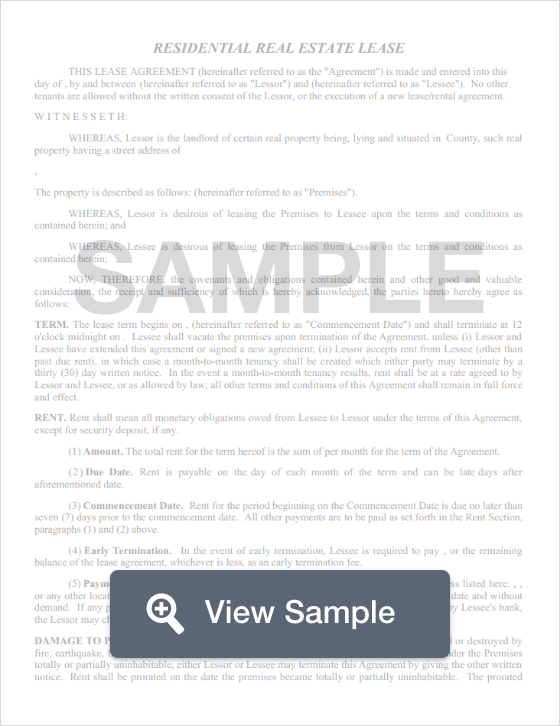Make a Georgia Lease Agreement
Create a Georgia Lease Agreement with our customizable template!

What Is a Georgia Lease Agreement
A Georgia lease agreement is a real estate contract between the landlord or property management company and the tenant who wants to rent a specific piece of property. Once the parties sign the contract, the tenant may then take legal possession of the property. Georgia lease agreements can be used for residential or commercial properties.
Looking for other Georgia documents?

Business
- Georgia Non-Compete Agreement
- Georgia Non-Disclosure Agreement
- Georgia Promissory Note

Personal
- Georgia Last Will and Testament
- Georgia Living Will
- Georgia Power Of Attorney

Real Estate
- Georgia Bill Of Sale
- Georgia Eviction Notice
- Georgia Month-to-Month Lease Agreement
- Georgia Quit Claim Deed
- Georgia Rental Application
- Georgia Sublease Agreement


Sample Georgia Lease Agreement


Search Documents
Related Documents
Looking for other Georgia documents?

Business
- Georgia Non-Compete Agreement
- Georgia Non-Disclosure Agreement
- Georgia Promissory Note

Personal
- Georgia Last Will and Testament
- Georgia Living Will
- Georgia Power Of Attorney

Real Estate
- Georgia Bill Of Sale
- Georgia Eviction Notice
- Georgia Month-to-Month Lease Agreement
- Georgia Quit Claim Deed
- Georgia Rental Application
- Georgia Sublease Agreement
Most Commonly Used Georgia Lease Agreement
The most commonly used Georgia rental agreements are commercial lease agreements, standard residential lease agreements, month-to-month leases, lease to own agreements, roommate agreements, and sublease agreements.
Although most of the commonly used Georgia lease agreements include the same components, they do have some differences. For example:
- A roommate agreement may have all of the same elements of a standard residential lease agreement. However, it differs by explaining which areas are for the exclusive use for the roommate and which areas are considered common and may be used by all the occupants.
- A standard residential lease agreement is generally for one year in length. When it ends, it may automatically renew for another year or it may convert to a month-to-month lease. Both types may require that either party wishing to not renew the lease must provide the other party with a 30-day written notice about vacating the property.
How to Write a Georgia Lease Agreement
A Georgia lease must comply with Georgia landlord-tenant law. Otherwise, the lease will not be enforceable. There are other laws that must also be considered. You’ll learn about those in the sections related to disclosures and security deposits.
Before you sign a Georgia lease agreement, you should read the terms or have it reviewed by an attorney.
A Georgia lease agreement needs to include:
- Names of the Parties - This includes the landlord's full name or the property management company's legal business name and the full name of the tenant(s).
- Property Address - This is the full address for the rental property, including the city, zip code, and any unit or lot number.
- Term Information - This is the type of lease agreement the parties agree to enter into. For example, a month-to-month lease or a fixed term. A fixed-term lease means that the parties agree that the tenant will hold possession of the space for a certain amount of time, usually one year. If it is a fixed lease, this section should include the date that the lease will end.
- Rental Amount - This includes the date that the lease will begin, the amount of the monthly rent, the day of the month that rent is due, and the address where the rent may be paid.
- Late Fees - This lists any applicable fee that is due if the rent is not paid by a certain date.
- Security Deposit - This is the amount of money that must be paid in advance of the tenant taking control of the property. A security deposit is used to repair damages caused by the tenant.
- Initial Payment - This is the total amount of money that the tenant must pay to move into the rental property. This area should include the amount of the first month's rent, the security deposit, and the total of the two numbers added together.
- Occupants - This is the full name of each tenant must be listed even if they are a minor or are not signing the lease for some reason. This part of a Georgia residential lease agreement establishes who will reside in the residential unit. For commercial space leases, it designates those who have permission to use the space. If the presence of additional occupants changes the price of the rent, it should be included in this section.
- Utilities - This area notes which utilities or services a tenant does not pay.
- Parking - This informs the tenant if they will receive a parking space. If a parking space is reserved and there is a designated spot, the spot should be listed in this section.
- Furnishings - This tells tenants what they are allowed to install (such as a washing machine or dishwasher) or what they may not install. If the tenant is not allowed to bring their own appliances, that should be designated in this section.
- Notices - This section lists the names of both the landlord (or property manager) and tenant along with their proper address. This contact information should be used if the parties need to send out a notice to the other party for some reason.
- Eviction - Here, tenants learn about how eviction proceedings would be carried out in the event of nonpayment or breach of other lease terms.
- Additional Terms - This section lists any other obligations that the parties agreed to that haven't been included in any other section of the lease agreement.
- Signature and Date - The document should be signed and dated by all parties.
Which Disclosures Belong in a Georgia Lease Agreement?
There are several disclosures that must be made at the time the landlord and the tenant enter into a Georgia lease agreement. The first is a flood disclosure. If the property has flooded three or more times during the last five years, the landlord must inform the tenant. The second is the identification of any manager, individual, or agent who is allowed to be on the property on behalf of the landlord. The third disclosure is a list of prior damages to the property. The landlord must provide it when they receive the security deposit. This is often referred to as an inspection form. The fourth disclosure is specific information about previous tenants. If a former tenant was infected by a virus, died, committed murder, or another felony on the property, the new tenant is legally obligated to receive that information.
Finally, if the residential unit was built prior to 1978, the landlord must provide a lead-paint disclosure under federal law.
What You Need to Know About Georgia Lease Agreement Deposits?
In Georgia, there is no state law that caps security deposits. However, at the end of the lease, the landlord must return the deposit within one month. If the landlord keeps part of the deposit for damages, they must provide an itemized list and those items cannot be considered ordinary wear and tear.

Create a Georgia Lease Agreement in minutes with our professional document builder.













